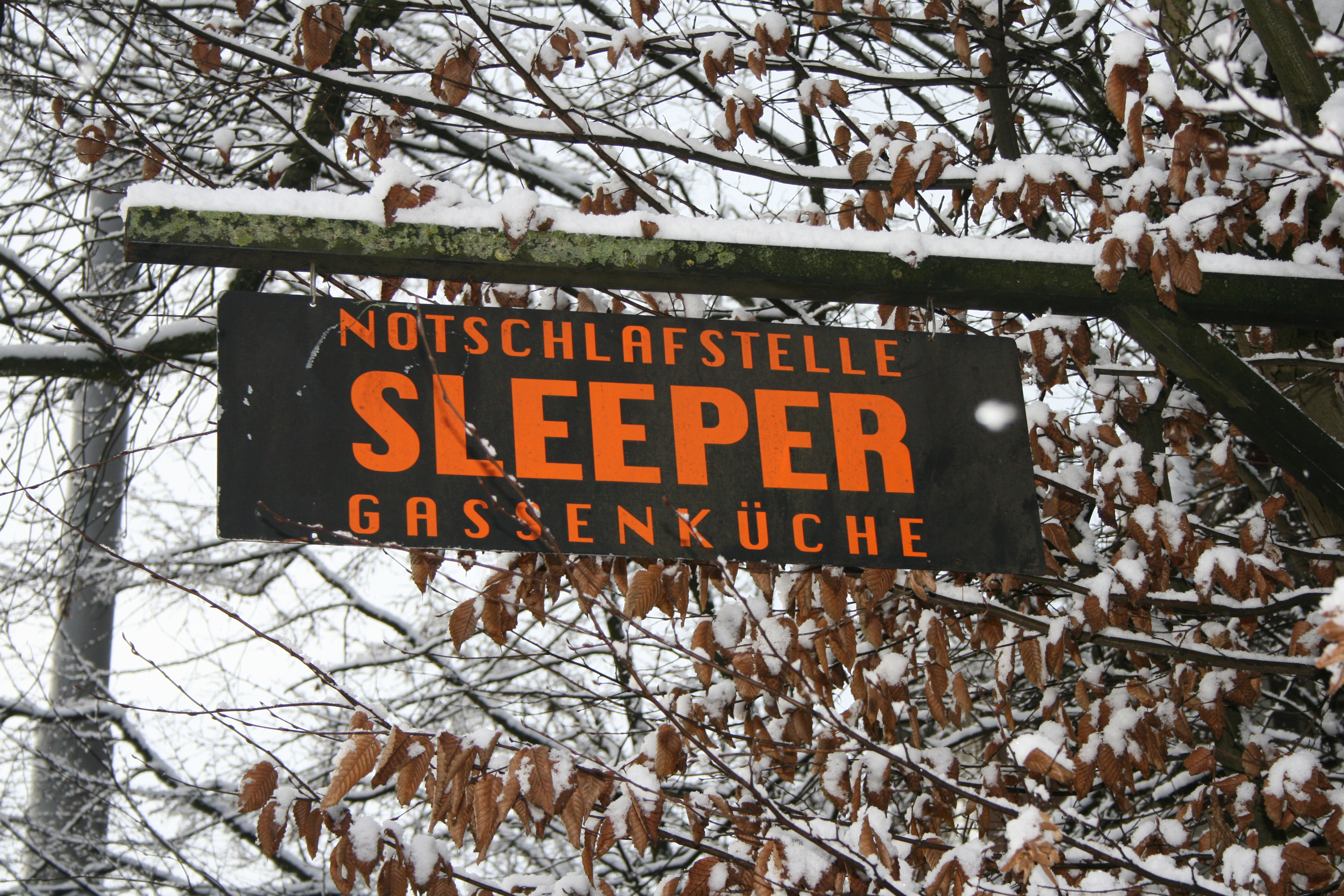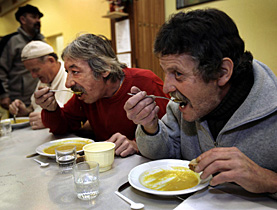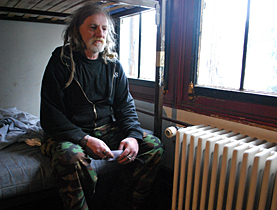Providing warmth and company for the homeless

Many large Swiss cities provide overnight shelters for the homeless, which offer not only a warm bed, but also company – particularly precious at Christmas time.
“In winter we have more guests than usual,“ said Brigitte, who has been working in the Sleeper, an emergency shelter in Bern, for nearly ten years.
Brigitte is on the day shift, and has to see to breakfast and to the cleaning. It is also her duty to make sure that the all the guests are out by 10am at the latest, since they are only allowed inside the building between 10 at night and 10 in the morning.
The 20 beds are divided between three rooms. One is reserved for women, one for Swiss and one for foreigners.
“This separation has paid off, because sometimes there used to be friction between the Swiss and the foreigners,” Brigitte told swissinfo.ch. “Beds are allocated on the principle of first come, first served.”
“When the beds are full, we can put extra mattresses on the floor, as we had to last night. We try not to send anyone away.” But if there really isn’t enough room, they send people to another institution, such as the Salvation Army’s night hostel.
The Sleeper is a private association. It is financed by donations and by the social services which undertake to pay the costs of people who use the facility. The takings of the bar, which is in the same building, also go into its kitty.
A team of about 20 oversees the running of the hostel. It has no paid employees; everyone is a volunteer.
Reasons for homelessness
The last guests of the night are collecting their breakfast, which is included in the SFr5 ($4.8) charged for the accommodation. “Most of the people who come to the night shelter are homeless”, Brigitte explained.
The emergency shelter provides accommodation to everyone, regardless of whether they come from the city of Bern or not. The guests range in age from a 20-year-old youth to a woman who could be a grandmother.
Sometimes the police bring in people for whom they can’t find anywhere else to stay. Some stay for just one night.
“But we also have a lot of long-term guests, who are allowed to stay for a maximum of three months,” Brigitte said. “After that they are supposed to find somewhere else. But if they are unsuccessful, they can stay longer.”
There are a number of different reasons why the guests have become homeless in the first place.
“We have a lot of drug dependents, mainly young people, but also some older ones, who can no longer find their way in today’s society,” says Brigitte.
“They are people who find it hard to fit in, to keep a flat clean, or to look after their finances.“
Many of them once worked at ordinary jobs and for years had normal lives. They may have landed up in the streets as a result of unemployment or drug dependency – and it can happen to anyone, “from dentist to worker”, says Brigitte.
Loneliness
The Sleeper is open every night, including Christmas. The building looks from the outside as if it is about to collapse, but it is warm and cosy inside. Along with the accommodation, it also houses a soup kitchen.
“Some of the same guests use both the soup kitchen and the emergency shelter,” Brigitte explained. “But there are some who don’t have a lot of money for supper. A meal with us costs five francs.”
But the reason why a lot of people visit the soup kitchen seems to be because they don’t want to eat by themselves. Loneliness, especially during the Christmas and New Year holiday time, is something a lot of the guests talk about.
Many of them either don’t have a family at all, or have lost contact with their relatives. They are more aware of this lack at Christmas than at most other times. The Sleeper provides company.
The hostel continues as usual during the holiday period. The guests are able to stay inside until 11am, the normal time on Sundays and holidays. And the soup kitchen will have a roast joint for Christmas dinner.
The basic minimum
The Sleeper provides the basic minimum. People who spend the night here can take a shower or leave their things where they will be safe. For SFr2 they can have their laundry done.
But this is not somewhere where the guests can look for advice. “Our role is just to give people a warm bed,” said Brigitte.
But she is well aware that it is not only the night which challenges many of the guests.
“They worry about the day, because they don’t know how and where to spend the time, nor how they can get enough money for a midday meal.”
Sandra Grizelj, swissinfo.ch (Translated from German by Julia Slater)
Homeless people who have consumed drugs or alcohol are in particular danger of death from exposure.
If they fall asleep outside, their core body temperature drops. Normal body temperature is about 37°C.
Hypothermia is any body temperature below 35°C. Below 28 °C is described as “severe hypothermia”, and is likely to result in death.
People with mental problems are another at-risk group, if their sensitivity to cold is affected.
People are regarded as homeless when, either temporarily or permanently, they do not have anywhere suitable to live, no place to sleep at night, no money for accommodation and no address.
The city of Bern distinguishes between three types of assisted accommodation:
Low-level accommodation: Facilities “similar to emergency shelters“ with minimum support. Possible to stay inside during the day.
Supervised accommodation: Supervision practically round the clock, including the dispensing of medicines, and two warm meals per day.
Supported or independent accommodation: Flats are provided. Support staff are not continuously on hand.
A total of 200 places are available.

In compliance with the JTI standards
More: SWI swissinfo.ch certified by the Journalism Trust Initiative




You can find an overview of ongoing debates with our journalists here. Please join us!
If you want to start a conversation about a topic raised in this article or want to report factual errors, email us at english@swissinfo.ch.